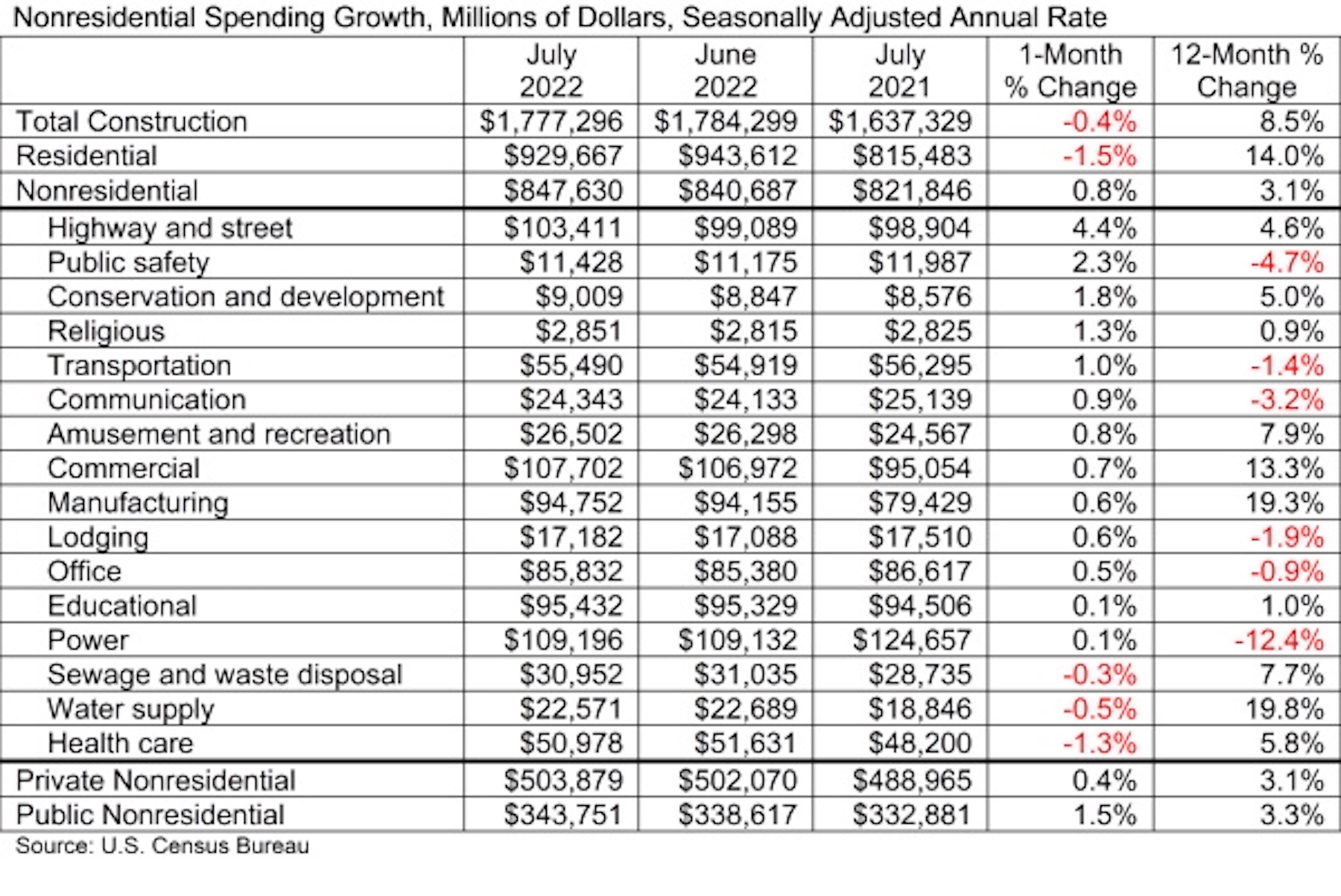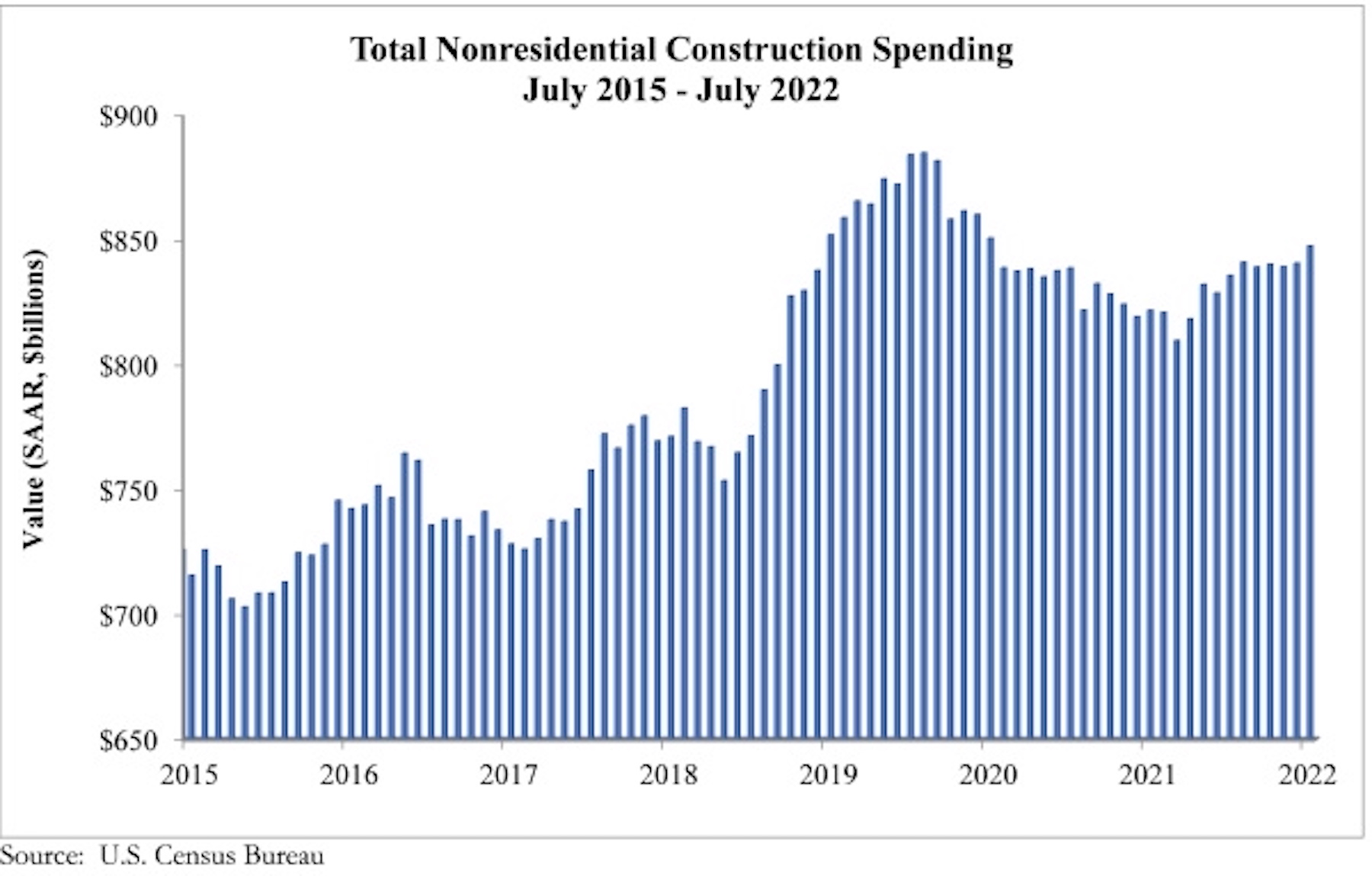National nonresidential construction spending increased 0.8% in July, according to an Associated Builders and Contractors analysis of data published today by the U.S. Census Bureau. On a seasonally adjusted annualized basis, nonresidential spending totaled $847.6 billion for the month.
Spending was up on a monthly basis in 13 of the 16 nonresidential subcategories. Private nonresidential spending was up 0.4%, while public nonresidential construction spending was up 1.5% in July.
“The nonresidential sector continues to grapple with rising borrowing costs, elevated materials and labor costs and pervasive economic pessimism,” said ABC Chief Economist Anirban Basu. “Despite a modest increase in July, nonresidential construction spending remains below its pre-pandemic level. There is, however, at least one bright spot for the industry: publicly financed construction. State and local governments are flush with cash, and considerable funding is slated for various forms of infrastructure. In July, spending in the highway and street category increased 4.4%, while spending in the public safety category rose 2.3%.
“For privately financed construction, circumstances could get worse before they get better,” said Basu. “The Federal Reserve recently recommitted to further tightening monetary policy. Market sentiment quickly turned negative. Rather than disappear, supply chain challenges are proliferating in much of the world, including in Europe and China, and the risk of recession is elevated. This is simply not a set of circumstances conducive to rapid nonresidential construction spending growth, and according to the most recent Construction Confidence Index, just 31% of contractors expect their profit margins to grow over the next six months.”


Related Stories
| Aug 11, 2010
Suffolk Construction Company acquires William A. Berry & Son
Suffolk Construction Company, New England’s largest construction company announced today that they have acquired William A. Berry & Son (Berry), the second largest construction company in the region. The two companies, both with deep New England roots and successful track-records, combined will have more than 1,200 employees and projected revenues of $2 billion.
| Aug 11, 2010
University of Florida aiming for nation’s first LEED Platinum parking garage
If all goes as planned, the University of Florida’s new $20 million Southwest Parking Garage Complex in Gainesville will soon become the first parking facility in the country to earn LEED Platinum status. Designed by the Boca Raton office of PGAL to meet criteria for the highest LEED certification category, the garage complex includes a six-level, 313,000-sf parking garage (927 spaces) and an attached, 10,000-sf, two-story transportation and parking services office building.
| Aug 11, 2010
Draft NIST report on Cowboys practice facility collapse released for public comment
A fabric-covered, steel frame practice facility owned by the National Football League’s Dallas Cowboys collapsed under wind loads significantly less than those required under applicable design standards, according to a report released today for public comment by the Commerce Department's National Institute of Standards and Technology (NIST).
| Aug 11, 2010
USGBC honors Brad Pitt's Make It Right New Orleans as the ‘largest and greenest single-family community in the world’
U.S. Green Building Council President, CEO and Founding Chair Rick Fedrizzi today declared that the neighborhood being built by Make It Right New Orleans, the post-Katrina housing initiative launched by actor Brad Pitt, is the “largest and greenest community of single-family homes in the world” at the annual Clinton Global Initiative meeting in New York.
| Aug 11, 2010
AIA report estimates up to 270,000 construction industry jobs could be created if the American Clean Energy Security Act is passed
With the encouragement of Senate majority leader Harry Reid (D-NV), the American Institute of Architects (AIA) conducted a study to determine how many jobs in the design and construction industry could be created if the American Clean Energy Security Act (H.R. 2454; also known as the Waxman-Markey Bill) is enacted.







